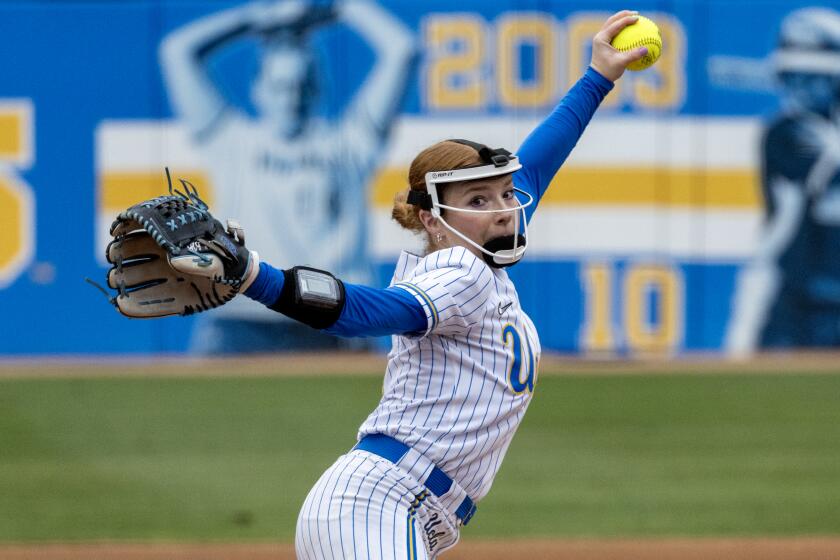Twin-Engined
- Share via
They behaved the way identical twins often do, forever attentive to fairness and ensuring the other received his due.
Keith Smith and Ortege Jenkins transformed the most difficult of arrangements--quarterbacks splitting playing time--into the most celebratory of seasons for Arizona.
They were selfless, not selfish. Competitive, not covetous.
Two snapshots best capture a 1998 Wildcats’ campaign marred only by a midseason loss to UCLA. Both, appropriately, include Smith and Jenkins in the same frame.
Jenkins scored on the last play of a 31-28 victory over Washington by doing a somersault over three defenders and landing on his feet in the end zone. His next move was even better, grabbing Smith and holding him tight while cameras clicked away.
Smith reciprocated after earning offensive most valuable player honors at the Holiday Bowl, a 23-20 victory over Nebraska. He embraced Jenkins at midfield to again underscore that their every accomplishment was shared.
What can the partners in passing do for an encore?
“We’re both OK with more of the same,” Smith said. “I wouldn’t expect anything to change as long as we win.”
Smith played more than Jenkins late in the season, a trend that many suspect will continue. But with Arizona in the top five of most preseason polls and the favorite to win the Pacific 10 Conference, the former Newbury Park High star is smart to keep his focus on the team.
Yet, Smith must wonder. Instead of the 165 passes he threw last season, what if he’d been able to throw the 325 Akili Smith threw for Oregon?
As it was, he set a Pac-10 record with a passing efficiency rating of 174.2 and led the conference by completing 68.5% of his passes. Smith passed for 1,732 yards and 13 touchdowns.
For his part, Jenkins completed 49.3% of his 142 passes and had an efficiency rating of 115.1. He passed for only five touchdowns and 1,011 yards, yet came up with big plays in several games.
“It would be hard to imagine starting the season and not giving them both an opportunity,” Coach Dick Tomey said. “Keith set a record for passing efficiency and O.J. made the key play in college football last season.
“The most remarkable thing is the respect they have for one another, not only personally but in each other’s capabilities. It’s genuine. When we came up with this system, I asked them both, ‘Could you be a backup?’ They said, ‘Sure.’ ”
Despite their relentless happy faces, for cameras and coach, Smith and Jenkins might be less congenial should Arizona lose. Tomey knows this.
“If we are 6-6, is the chemistry the same between them?” he said.
To best keep that scenario purely conjecture, Smith stayed in Tucson all summer and organized daily seven-on-seven workouts, putting up signs in the locker room and making sure he was the first player on the field.
Smith, a senior, dropped 16 pounds to 196 and feels quicker than he has since the magical night in 1993 when he zig-zagged 93 yards for a touchdown to give Newbury Park a Southern Section championship and unbeaten season.
“This is the best I’ve ever felt, for sure,” he said, adding that he ran his fastest 40 this summer, 4.53.
Jenkins, a junior, worked one-on-one with quarterback guru Homer Smith for 10 days at Alabama and spent the rest of the summer at home in Long Beach.
“I got a lot better,” Jenkins said. “I’m ready to make a big contribution.”
The quarterbacks have different builds and backgrounds, and bring different strengths to the field.
At 6-foot-2, Jenkins is a drop-back passer with the ability to scramble. His rifle arm was erratic at times last season and he was unable to duplicate the success of his freshman year, when he replaced an injured Smith to throw a Pac-10 freshman record 19 touchdown passes.
Smith is shorter but more mobile. And at the age of 23--this is his sixth year out of high school--he brings uncommon maturity and composure to the huddle.
“I think Keith has grown in the cerebral areas,” Tomey said. “He understands coverages so well. He understands defenses inside and out.”
Consistency was Smith’s strength last season. He completed more than half his passes in every game and approached the conference record completion rate of 70.7% set by Rich Campbell of California in 1980.
Much like the signature scrambles that have resulted in 13 touchdowns and nearly 1,000 yards rushing in his career, Smith’s improvement has come in starts, stops and breathtaking bursts.
He signed a baseball contract with the Detroit Tigers at 18, but after one season returned his $220,000 bonus and enrolled at Arizona. He redshirted in 1995 and had moderate success the following year, taking the starting job from Brady Batten in the fourth game and completing 60.6% of his passes for 1,450 yards and 11 touchdowns.
Arizona was 5-6 that season and 6-5 in 1997, when Smith was injured in the fourth game and lost his job to Jenkins. Smith played some at slot receiver, catching four passes, and stepped in to throw three touchdown passes against Cal when Jenkins struggled.
Smith contemplated transferring and returned to baseball briefly, spending a few days at the Tigers’ camp in Lakeland, Fla., in the summer of 1998 before leaving when he realized his heart still was in Tucson.
Baseball hasn’t given up on Smith. The Toronto Blue Jays selected him in the first round of the Rule 5 draft last fall and asked him to play this summer. Smith declined.
“I told the Blue Jays I still want to focus on football for the foreseeable future,” he said. “I gave it two shots with the Tigers. The second time, especially, I never felt good.”
Heavy on his mind at the time was the health of his father, Stu, who contracted prostate cancer and suffered a series of small strokes.
Also, Smith was charged with driving under the influence of alcohol after Arizona’s ’97 victory over Cal and he was too embarrassed to tell his parents.
“I regret it to this day,” he said. “It was very stressful on me. I didn’t tell my parents for a long time. When I did, they were crushed. It was a mess. I should have told them earlier.
‘I definitely learned from it. I told myself, ‘Keith, let’s get serious. Kids are looking up to you. You can’t be screwing around.’ ”
Smith served 24 hours in jail on the charge after the Holiday Bowl in January, but because his father was cured of cancer, his mind already was more at ease.
“Dad’s looking good,” Smith said. “He and my mom have their tickets to every game.”
Smith’s parents will travel to Penn State for Arizona’s opener Aug. 28, a game matching two teams ranked in the top five.
“Nobody on this team can think we can win just by taking the field,” he said. “The difference between a 7-5 team and a 12-1 team is only a few plays. That much I’ve learned.”
Whether the key plays begin with a snap to him or to Jenkins is something Smith is beyond worrying about.
“When I get in there, I take advantage of my time,” he said. “I want to lead our team down the field and eliminate turnovers.
“When O.J. and I congratulate each other, it’s natural. We aren’t putting on a show for people. We just want to keep winning. Why break up a good thing?”
More to Read
Go beyond the scoreboard
Get the latest on L.A.'s teams in the daily Sports Report newsletter.
You may occasionally receive promotional content from the Los Angeles Times.











